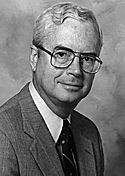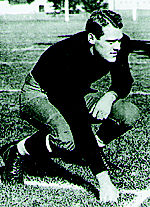
 |
||
The Yale Alumni Magazine is owned and operated by Yale Alumni Publications, Inc., a nonprofit corporation independent of Yale University. The content of the magazine and its website is the responsibility of the editors and does not necessarily reflect the views of Yale or its officers. |
Economist Janet Yellen ’71PhD, who chaired President Clinton’s Council of Economic Advisers from 1997 to 1999, has been elected a fellow of the Yale Corporation by the alumni. A professor at the University of California at Berkeley, Yellen has researched subjects ranging from the effect of Federal Reserve policies to social problems such as gangs and out-of-wedlock births. Yellen, a 1967 graduate of Brown, is married to economist George Akerlof ’62; their son Robert is in the Class of 2003.
Physicist and engineer Paul A. Fleury has been named dean of engineering, succeeding D. Allan Bromley. Fleury, who most recently was the dean of engineering at the University of New Mexico, spent nearly 30 years at Bell Laboratories, where he conducted research in the fields of condensed matter and optical science. He earned his undergraduate degree from John Carroll University in 1960 and his PhD from MIT in 1965.
“Can 35 million book buyers, and their offspring be wrong?” asked Sterling Professor of Humanities Harold Bloom in a Wall Street Journal essay this summer. “Yes, they have been, and will continue to be so for as long as they persevere with [Harry] Potter.” Bloom was a rare dissenting voice during the summer’s Pottermania, arguing that J. K. Rowling’s best-sellers lack “imaginative vision” and are “heavy on cliché.”
Environmental writer and farmer Wendell Berry delivered a fiery keynote address in Commons at the “Good in Nature and Humanity Conference” held May 11–14 and sponsored in part by the forestry and divinity schools. “The global economy is an enemy of the natural world, good work, and sound economic practices,” said Berry, who called for a return to a “local economy” that emphasized the importance of stewardship "True wealth lies in meeting our own needs.”
President Richard Levin ’74PhD and three other members of a blue-ribbon panel convened by Major League Baseball released their report on the sport’s economics this summer. Seeking to correct the financial inequities that make it hard for small-market teams to compete, the panel proposed an expanded program of revenue sharing, incentives to keep total team salaries within certain limits, and reforms to the draft to aid weaker teams. Levin said the measures are in the best interests of baseball, invoking the name of his Yale predecessor, A. Bartlett Giamatti. “Bart would have approved,” said Levin.
History professor Paul Kennedy has been in New Haven for 17 years now, but they haven’t forgotten him back home in England. Kennedy is to be made a Commander in the Most Excellent Order of the British Empire in an investiture ceremony at Buckingham Palace this fall. An international historian best known for his 1988 book The Rise and Fall of Great Powers, Kennedy was lauded for his “services to contemporary history.” Close-Up A Yale football captain wins the Heisman Trophy and turns down Hollywood’s offer to film his story—playing himself? For today’s Bulldogs—even Joe Walland—it’s only the stuff of daydreams. But it happened to Larry Kelley ’37. Kelley, one of two Elis to win the Heisman (the other was his teammate Clint Frank ’38), died on June 27 at the age of 85, apparently from a self-inflicted gunshot wound.
Born in Ohio and raised in Pennsylvania, Kelley came to Yale from the Peddie School. He was a standout in football for three years in an era when Yale was still a national power in the sport. Playing both offense and defense, as was the custom at the time, Kelley was instrumental in a famous upset of Princeton in 1934 and led Yale to a 7–1 season in his senior year. He was also captain of the baseball team his senior year and played varsity basketball. He won the Heisman in only the second year of its existence, when it was somewhat less well known. Recalled Kelley, “I got the telegram telling me that I had won it, and I didn’t even know there was such a thing.” Kelley turned down both Hollywood and professional football when he graduated. Instead, he went into coaching, first at the Peddie School, then later at Cheshire Academy. Later, he returned again to Peddie as alumni director, where he remained until his retirement in 1975. Kelley was in the news last year when he sold his Heisman at auction for $328,110. Having suffered a stroke, Kelley explained that he wanted to get his affairs in order and leave something to his wife and his nieces and nephews. A sports bar in Garrison, New York, bought the trophy. A group of alumni bought other Kelley memorabilia at the auction, including some of his uniforms, and gave them to Yale. “We couldn’t buy the trophy,” says Christopher Getman ’64, who organized the group. “But Larry
"knew that this stuff was going to Yale, and that made him happy.” |
|
|
|
|
|
|
|
|
©1992–2012, Yale Alumni Publications, Inc. All rights reserved. Yale Alumni Magazine, P.O. Box 1905, New Haven, CT 06509-1905, USA. yam@yale.edu |
||






